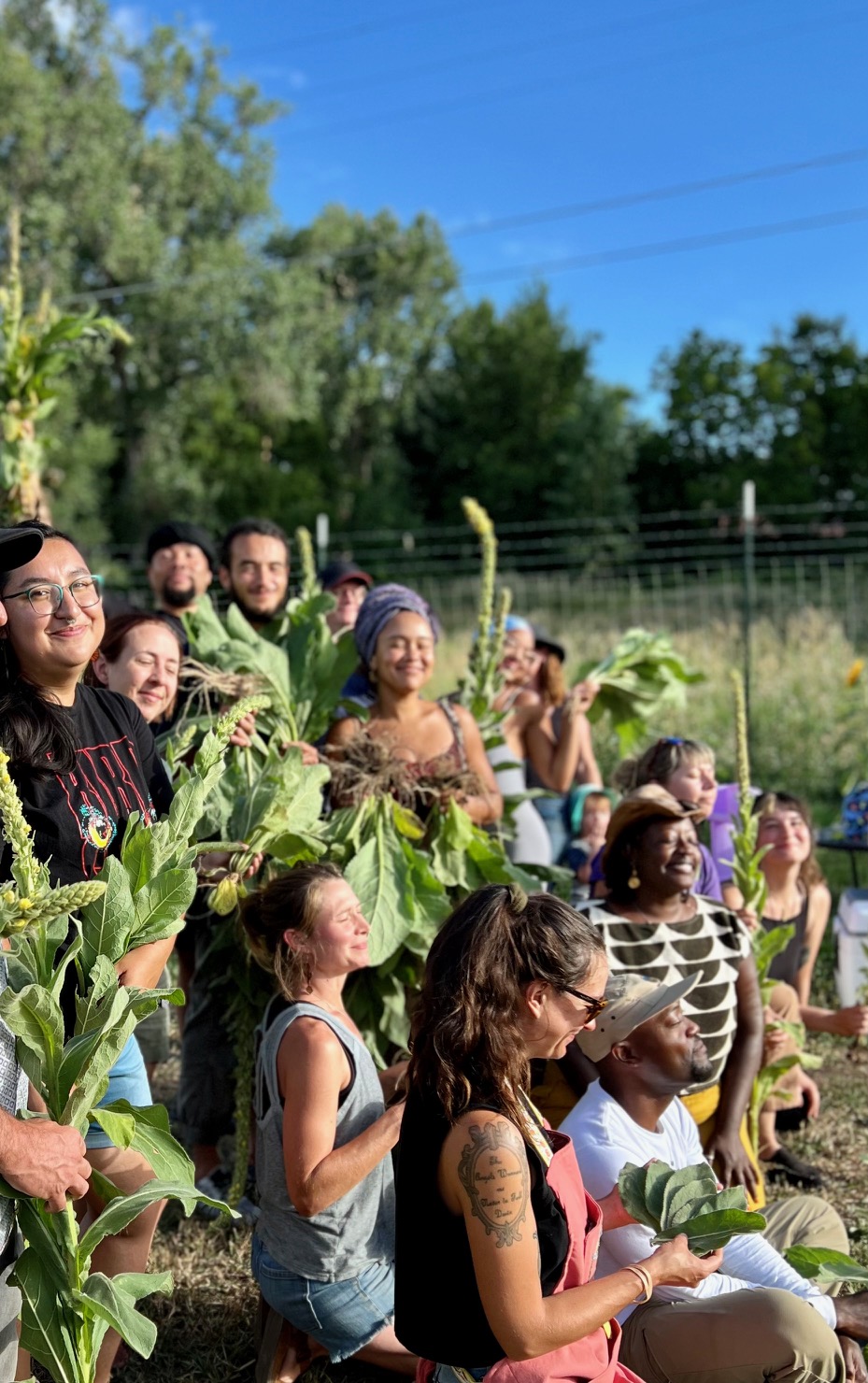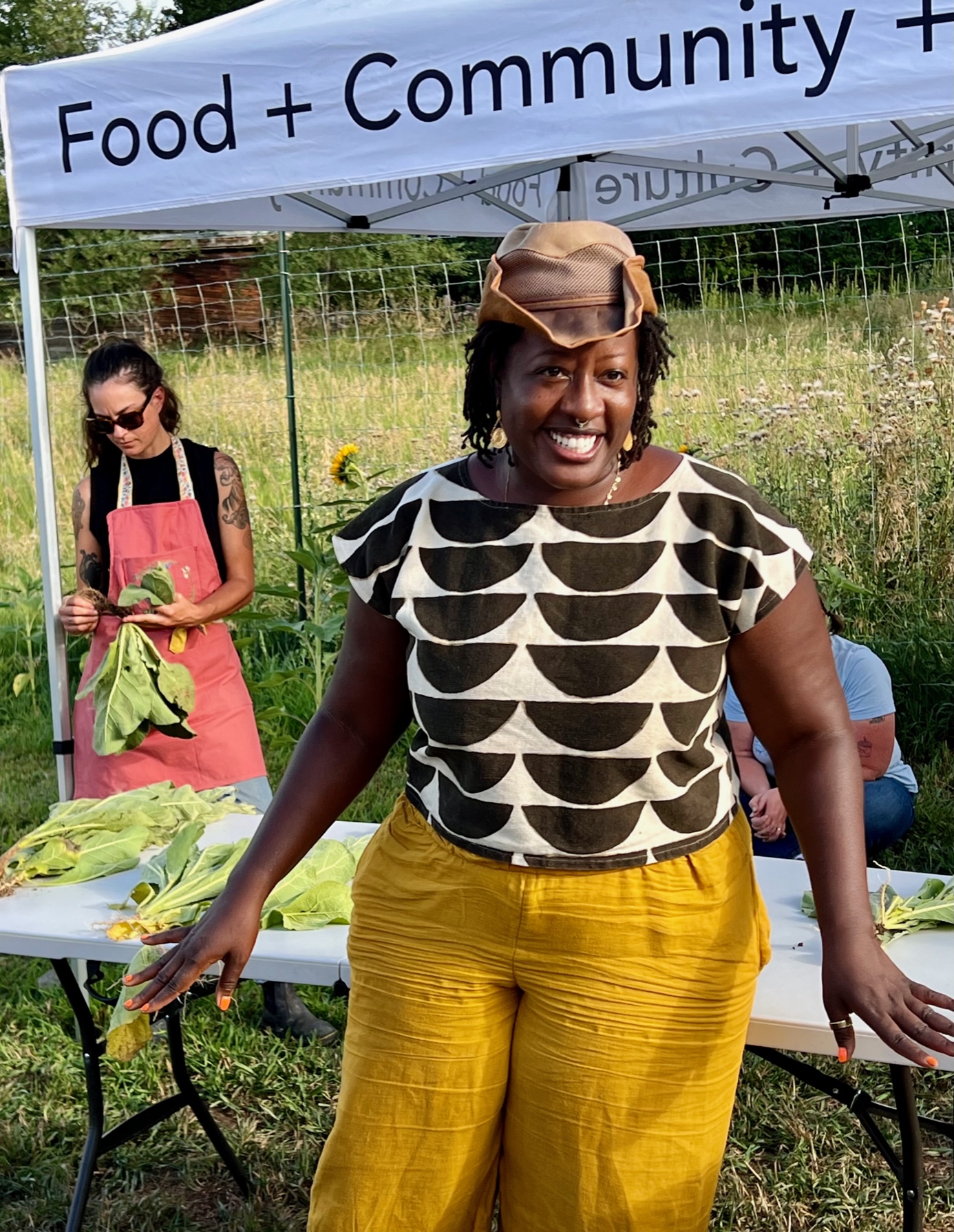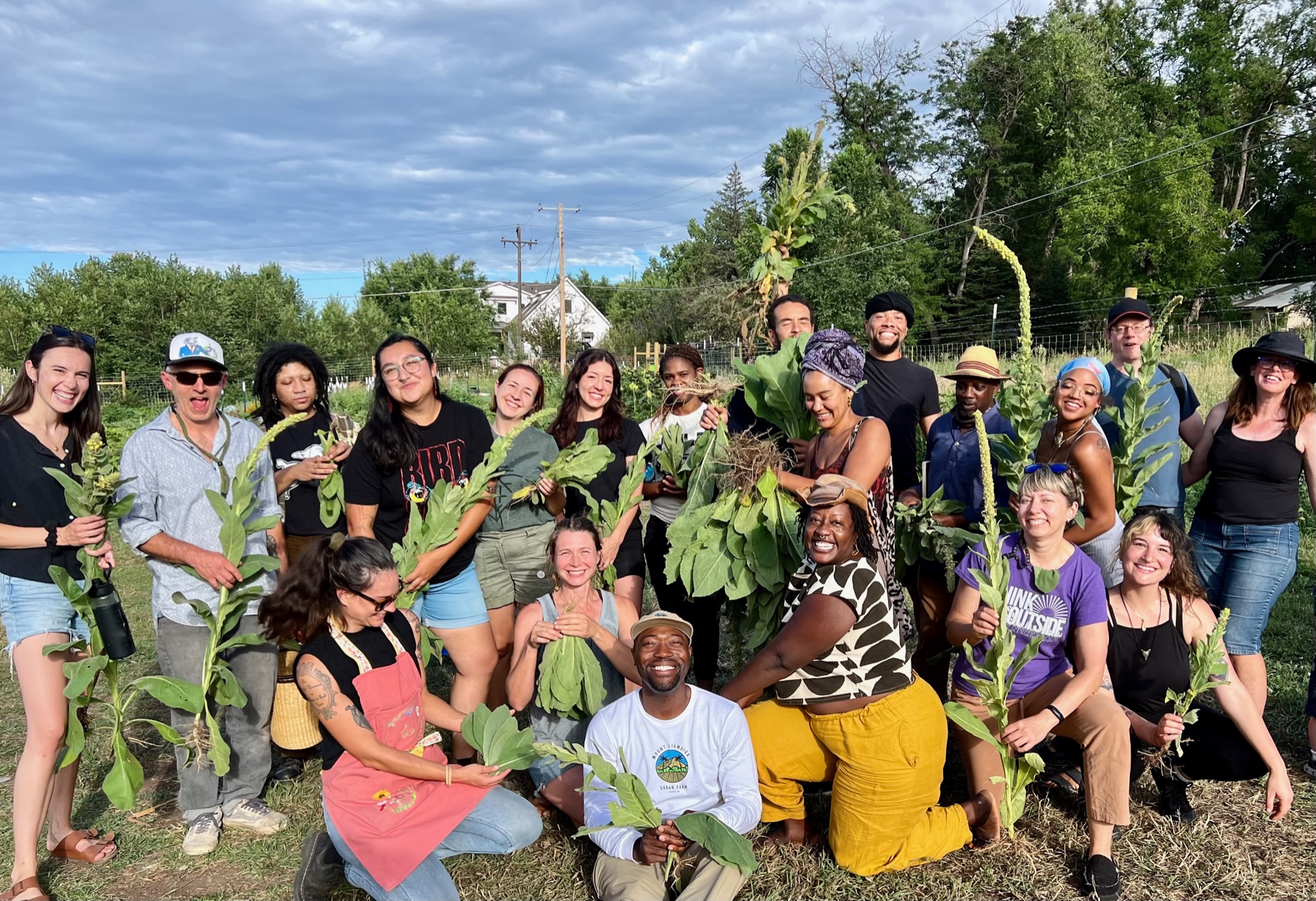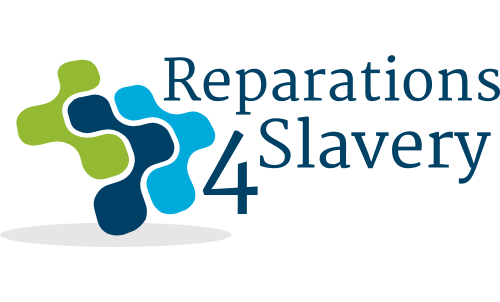Interview with Asia Dorsey
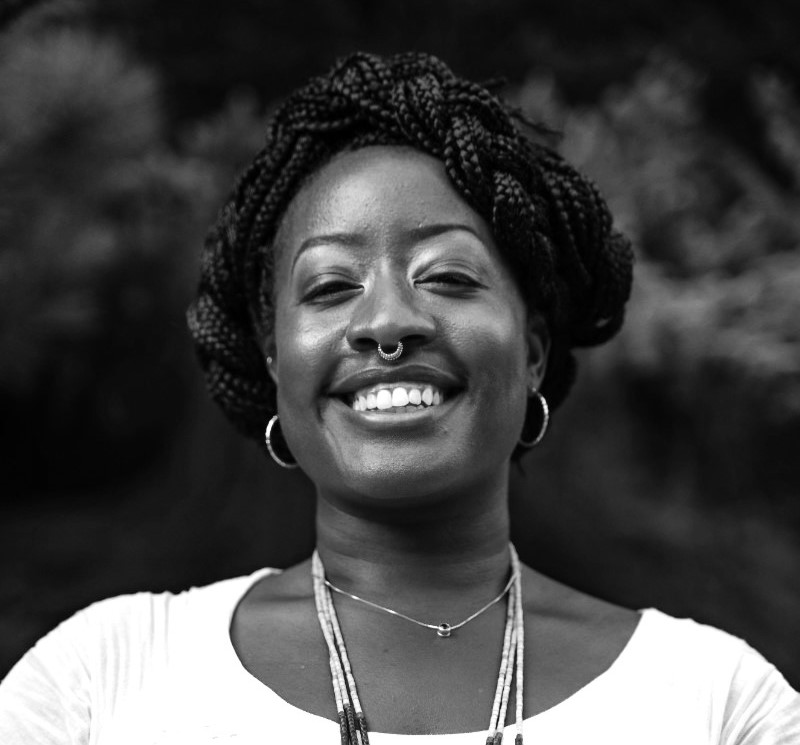
She codeveloped the Modern Vectors of Economic Transformation Curriculum and is the Host of R4S' Healing Black Futures podcast.
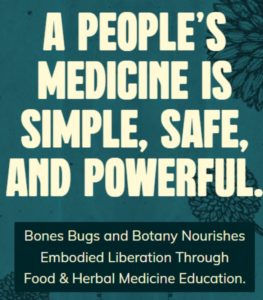
R4S: Welcome Asia. Wonderful to be with you. Let’s start at the beginning - how would you define ‘reparations?’
AD: It’s great to be here! So, I see reparations as a healing process at the level of society, the collective. It's about righting historical wrongs. As a healer, I see reparations as a medicine that we can apply to heal the wounds of the past to grow the reparative future.
Lotte and I produce a podcast called Healing Black Futures. I host the podcast, and we speak to Black people doing this healing work. It’s all about learning to envision a repaired future. Being able to envision change is important to the reparations movement. It’s not just about naming the oppression of the past – you must be able to envision a repaired future to know what steps are needed to create it.
The earth is preparing us for a great transition. The world's got to be radically different if we are to survive. Everyone can feel that change is coming. One response is a fear-based response to cloister and to create our own little bunkers – we see wealthy white families doing that now. But the other response is to build social infrastructure and capacity for all people to weather the storm. That’s where we want to be.
"At some level, white people know their souls are at risk."
Asia Dorsey
R4S: Why specifically do you think white people need to be involved in the movement for reparations?
AD: Because, at some level, white people know their souls are at risk. Regardless of their relationship with Black people, white people must restore their honor as a group. It's that simple. White folks need a clean slate – aren’t you tired of being the oppressor? No one talks about this, but white people are miserable – look at the society they’ve created. White people want to be folded back into the arms of Beloved Community. And the way that they can do that is by apologizing, engaging in reparative justice, and thus restoring that honor.
Look at all the different ways that shame manifests in the white community. So many white people have no understanding of their ancestral pasts. They are too afraid to understand themselves as the descendants of enslavers. White people don't want to see the shadow or confront the suffering they caused the whole world. They don’t want to take responsibility for it.
I can't understand that level of oppression because 400 years ago, let’s say I was a market woman in Nigeria. 400 years ago, I was running a household; I was the queen mother. Not to say that Africa was perfect. But 400 years ago in Europe, women were being burned. Think about the trajectory of each group of people. Think about the separate traumas each group faces. Healing this trauma is a path towards maturation, true liberation. This capacity of white folks to do this repair work is like a social initiation into adulthood.
"Making direct reparations means creating a legacy of repair."
Asia Dorsey
R4S: How does the idea of white families engaging in direct repair relate to the national reparations movement?
AD: Lotte and Briayna talk about reparative genealogy as a critical first step. This is shadow work, literally shadow work. White people need to understand who they are in history. Find the documents. This history of enslavement is irrefutable once you see the names, ages, and values on a slave census.
So, white families making direct repair means white families restoring their family honor, period. I don't think people understand what happens when there is darkness that lives inside a family. If there was a history of slavery and dehumanization, women and children were probably also treated like objects. If so, we have histories of slavery tied into histories of sexual abuse. That Is a virus that destroys families. And it shows up generation after generation. Restoring this honor is a kind of cleansing. But I don’t like that word - I will say it's like baptism.
Making direct reparations means creating a legacy of repair. For instance, the concept of direct repair can be built into a family budget, it can be built into how financial decisions are made, then that becomes a template for future generations’ behavior. And then, these future generations have this template and apply it to their businesses. They have these templates, and they apply them to their organizations. Budgets are where our morality lives. Making direct repair to actual humans. That's medicine for a family lineage.
Then, what are the individual conversations between brother and sister when one harms the other? They have the template of repair already there to reference. This leads to what reparationist Dr. David Ragland has called a culture of repair.
R4S: How does a white family engaging in direct repair become a socio-cultural template?
AD: If we have these models of repairing the family unit, and if interpersonal relationships reinforce these models, they will also organically expand to organizations. And these models of repair might then extend to our model of government. This could happen if, as a society, we commit to the healing of historic trauma.
"Quality of life is what reparations is about. It's not just an economic incentive for Black liberation and Black economics. No, it's about improving quality of life. My reparative lens? I think reparations are good for all people."
Asia Dorsey
R4S: So, what is your definition of collaboration? Because what I hear you talking about is liberating white people.
AD: Lotte is always bringing up the concept of co-liberation, the idea that our futures are intertwined, just as our pasts are, and we must work together to heal. I like to think that liberation can spread like wildflowers.
So, here’s a real example. I started researching wealth inequality. And I found that wealth inequality is the variable that consistently and reliably points to levels of violence. Let’s say the shit hits the fan in the future, and you have more white communities cloistered. I'm referencing Octavia Butler's Parable of the Sower, a story about a dystopian future. The quality of life of the white people and their little cloisters is terrible - they're constantly afraid of being raided. They’re stuck, immobile. Because it’s awful to be surrounded by poor people who will be violent because they need what you have.
Quality of life is what reparations is about. It's not just an economic incentive for Black liberation and Black economics. No, it's about improving quality of life. My reparative lens? I think reparations are good for all people.
R4S: I'd love to hear about your own personal and family experience. So, how did slavery and Jim Crow impact your family over the generations?
AD: Black female death. The women in my family don’t live into their 60s. It shows up in their physical bodies, in kidney disease, brought on by stress. I see the Black women around me folding. I see their bodies deteriorating in real time; I see the weight of the world upon their shoulders.
R4S: What would the difference have been if the 40 acres and a mule had truly been granted at emancipation? What would that have looked like for your ancestors?
AD: So, land is an asset that reproduces itself, which means that Black farmers and black agrarians needn't enter the market unless they choose to because everything that you need to survive, sparing some tools, is on your land. Black people have been historically denied our autonomy. That lack of worker autonomy over generations accumulates in these health outcomes that deteriorate the quality of life for the women in my family. We need our own space to make our own decisions. How much control do you have over your labor? That little parcel of land, that 40 acres, would have meant everything to my family.
For instance, when we think about sharecropping and the “company store” credit arrangement causing black people to be perpetually in debt, that debt meant that they didn't have the capacity to invest in assets they could have passed on generation by generation. It meant they needed to use their children as laborers instead of sending them to schools.
When you get to keep the money you earn, you accumulate it. But the thing about African Americans is that we are the most generous group of humans on this continent; Black people give more per capita than any other racial group. Even though we’re at the bottom, we still give the most. This is because we focus on the collective good rather than the individual good.
R4S: So, what will impact your family and your community when there is a national program for reparations?
AD: Black people sleeping at night. Black people with lower blood pressure. My female relatives living into their 90s. Black people achieving their dreams.
But there’s some work to do.
One of the critiques about cash reparations is that Black folks don't know how to use cash. Different groups have different relationships to money. And it can take generations to learn how to manage money. And so one of the issues with financial reparations is that the money would go directly to Nike and all of these white corporations that don't care about us. Some of the work that needs to happen is building cooperatively owned community institutions so that Black people have a sense of how to invest their money, slow it, sync it, and spread it within the Black community.
Non-cash compensation is also essential. My vision of reparations looks like free health care. The kind that the President gets that's what Black people deserve. I could go on, but the impact I care about is quality of life. I want black people to breathe easier. I want us to live in cleaner communities. I want the air, the water, and the soil to be uncontaminated.
"Begin that shadow work. I really want white people to look to the past to understand how we got to the unacceptable conditions of the present." Asia Dorsey
R4S: What three steps can we take today to help us get there?
AD: Begin that shadow work. I really want white people to look to the past to understand how we got to the unacceptable conditions of the present. I think it's essential that we do our genealogical work.
Step two, Black people are currently experiencing harm. People are currently hurting. How can we use our resources, skills, and talent to stop the bleeding?
Step three? Black people: we have done our work. Look at how Black scholars have influenced thinking in every single field. We've done the work. We need rest.
White folks, on the other hand? Do the work. It’s your turn to step up. And that starts with your shadow work. Join a cohort of learners on the same path; you don't have to build it. What's beautiful about the course that Lotte offers through this portal is the ability for people to explore the shadows together. You don't have to do it alone.
R4S: How is the balance of power maintained in a reparative relationship? Are there any danger zones? If so, what are they?
AD: The balance of power is maintained by understanding what each person is best at and letting them be their best. So, it's not about whose face is forward. For instance, in our work together, I'm a better public speaker than Lotte is, so I can step up there. But I'm not going to plan the events because she's better at that.
So, it's more about each person expressing their uniqueness and finding an ecological niche for each other's belonging. Lotte does a ton of labor on her end to make things easier on my end. That feels reparative to me.
Also, she is 29 years older than I am. So, all these factors make the relationship different: There's age, there's race, there's class, there’s experience. Boundaries are critical when a person with wealth forms a relationship with someone without wealth. There has to be a transfer of wealth, which can happen in many ways.
I just felt like we were meant to work together. Period. And so, all these beautiful compatibilities supersede our differences.
R4S: You met Lotte on a plantation in Louisiana in 2019. Please describe this initial encounter and what led you to accept a reparative relationship with Lotte.
AD: I was working with Dr. David Ragland, who leads the Grassroots Reparations Campaign, and we were invited by a group called Jubilee Justice to a reparations-focused retreat on Inglewood Plantation in Alexandria, Louisiana. As a side note, this location has become very important because I recently met my biological father for the first time. His entire family is from Alexandria! So, it’s likely that the plantation where I met Lotte was the plantation where my family may have been enslaved. Yeah. So that was really deep.
I just liked Lotte immediately because she was funny. Humor comes from deep honesty; we laugh because something resonates in our hearts. Once I found out she lived in Denver, I knew we would see each other again.
So, when we returned to Denver, we just started taking walks together and talking, and the reparative relationship developed organically. I became her herbalist, and she came to understand what I was good at. She invited me to work on this project. We developed a rhythm for how we like to work together. And that rhythm has been workable, fantastic, and mutually liberating because we each do what we’re good at.
"Hey, Lotte, did you take your stinging nettle this morning?"
"Hey Asia, did that spreadsheet make sense?"
We take care of each other.
Asia Dorsey
R4S: Lotte is in her 60s and white; you're in your 30s and black. How has the age difference, the race difference, the equation of who's repairing whom, how has that impacted you? And what is the most surprising thing to you about this relationship?
AD: I love both having a mentor and being a mentor. I would say that our relationship is regenerative because it creates healing. And this healing spills out into our respective communities. For example, Lotte created an excellent financial model for my business, Bones, Bugs, and Botany. I was like, "This is what I always needed", and she was like, "Ha! I told you so!", and I was like, "Ha! Now you’re my “numbers bitch!” We just laughed and laughed at that.
So, I shared that financial model with my co-op, and we used it for our last yoga retreat, where we took beautiful Black and brown people to the mountains and let them sleep for five days. Now, we can run our events without losing money. So, our love spills into all the communities we're part of.
How do we deal with all the differences? They don’t matter if there's respect. She is older. So, I know that maybe we're not going to go on a hike that day. But I would make a similar adjustment for a differently abled friend. We acknowledge our roles in terms of the Maiden, Mother, and Crone archetypes. I’m in the Mother phase of life; Lotte’s a Crone. Hey, Lotte, did you take your stinging nettle this morning? Hey Asia, did that spreadsheet make sense? We take care of each other.
R4S: Is there anything from your perspective that white people need to know before entering reparative relationships and genealogy?
AD: White people need to understand that Blackness is not a monolith. Nor is whiteness, for that matter. You know you're in a deep relationship when you stop thinking of each other solely regarding your skin color. I’m not saying I buy the “colorblind model,” but the goal is to be in a true relationship where our differences are respected.
Also, I facilitate Black-only and brown-only spaces because so many people of color have been actively harmed. They need that for themselves. And so, my white friends understanding why we need this separate space is essential to me. No, you can’t come to this event.
R4S: You have been an essential part of creating the R4S Portal. Your research formed the basis for the Modern Vectors of Economic Transformation curriculum. Describe this curriculum and why both black and white people need to study it.
AD: We have the Modern Vectors of Economic Oppression and the Modern Vectors of Economic Liberation curricula. It's essential that we did both because this project allows us to look at 14 different aspects of society, from Education and Arts to Medicine, to Justice, to Housing, and look at the history of Black exploitation in each, then at reparative solutions.
It's important to know why our social indicators are what they are today and to be able to trace the story back. I hated doing this research; it was so depressing. But I put my spirit into it. I put my heart into it because our history is essential for us all. For Black people especially, we are hard on ourselves about the choices our families had to make. But, when you understand this history, you understand that your family had no choice, only had a rock or a hard place. Our opportunities were far more constrained than those of the colonizers and enslavers – and this was done purposefully.
The Modern Vectors of Economic Liberation curriculum was fun to research. My distinct task was to find Black futurists and changemakers to understand how they find liberation. What does liberation look like? Who can articulate a mission and a vision toward that liberation? And what's the landscape of liberatory futures?
From that project, we started the Healing Black Futures podcast, where we dig deeper with specific changemakers in specific areas. This was quite an incredible project. It’s an excellent example of how we divide up our work – Lotte set the overall goals, I chose the interviewees, Lotte and I worked up the questions together, I did the interviews, and Lotte did all the production work.
"We learn that our futures are healed in the present moment."
Asia Dorsey
R4S: What do you want Black and White people to take away from the podcasts?
AD: In this series, we ask our guests to imagine the healing has already happened. Then, we ask them to explain what changes resulted in this healing. What we learn is that our futures are healed in the present moment. The actions that we take right now, by being in right relationship, are a healing force in the world.
R4S: What is your highest vision for what the R4S portal will accomplish or might accomplish?
AD: I hope that the materials on the R4S portal will help bring white people into right relationship with the past so that they can be in right relationship with the present. I want us to create a beautiful, healed, delicious future. And we must do that together.
